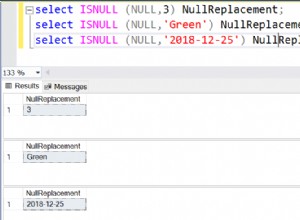A continuación se muestra el fragmento de código (casi) completo:
# ... omitted import statements and session configuration
def _date(date_str):
return datetime.strptime(date_str, "%Y-%m-%d")
class Match(Base):
__tablename__ = "match"
match_id = Column(Integer, primary_key=True)
date = Column(Date, nullable=False)
@hybrid_method
def match_count(self, timespan_days):
cut_off = self.date - timedelta(days=timespan_days)
sess = object_session(self)
M = Match
q = (
sess.query(M)
# .filter(M.match_id != self.match_id) # option-1: only other on the same day
.filter(M.match_id < self.match_id) # option-2: only smaller-id on the same day (as in OP)
.filter(M.date <= self.date)
.filter(M.date >= cut_off)
)
return q.count()
@match_count.expression
def match_count(cls, timespan_days):
M = aliased(Match, name="other")
cut_off = cls.date - timespan_days
q = (
select([func.count(M.match_id)])
# .filter(Match.match_id != self.match_id) # option-1: only other on the same day
.where(M.match_id < cls.match_id) # option-2: only smaller-id on the same day (as in OP)
.where(M.date <= cls.date)
.where(M.date >= cut_off)
)
return q.label("match_count")
def test():
Base.metadata.drop_all()
Base.metadata.create_all()
from sys import version_info as py_version
from sqlalchemy import __version__ as sa_version
print(f"PY version={py_version}")
print(f"SA version={sa_version}")
print(f"SA engine={engine.name}")
print("=" * 80)
# 1. test data
matches = [
Match(date=_date("2020-01-01")),
Match(date=_date("2020-01-02")),
Match(date=_date("2020-01-03")),
Match(date=_date("2020-01-05")),
Match(date=_date("2020-01-05")),
Match(date=_date("2020-01-10")),
]
session.add_all(matches)
session.commit()
print("=" * 80)
# 2. test query in "in-memory"
for m in session.query(Match):
print(m, m.match_count(3))
print("=" * 80)
# 3. test query on "SQL"
session.expunge_all()
q = session.query(Match, Match.match_count(3))
for match, match_count in q:
print(match, match_count)
print("=" * 80)
if __name__ == "__main__":
test()
El código anterior produce el siguiente resultado:
============================================================
PY version=sys.version_info(major=3, minor=8, micro=1, releaselevel='final', serial=0)
SA version=1.3.20
SA engine=postgresql
============================================================
<Match(date=datetime.date(2020, 1, 1), match_id=1)> 0
<Match(date=datetime.date(2020, 1, 2), match_id=2)> 1
<Match(date=datetime.date(2020, 1, 3), match_id=3)> 2
<Match(date=datetime.date(2020, 1, 5), match_id=4)> 2
<Match(date=datetime.date(2020, 1, 5), match_id=5)> 3
<Match(date=datetime.date(2020, 1, 10), match_id=6)> 0
============================================================
<Match(date=datetime.date(2020, 1, 1), match_id=1)> 0
<Match(date=datetime.date(2020, 1, 2), match_id=2)> 1
<Match(date=datetime.date(2020, 1, 3), match_id=3)> 2
<Match(date=datetime.date(2020, 1, 5), match_id=4)> 2
<Match(date=datetime.date(2020, 1, 5), match_id=5)> 3
<Match(date=datetime.date(2020, 1, 10), match_id=6)> 0
============================================================
mientras que la consulta q me gustaría a continuación (en postgresql ):
SELECT match.match_id,
match.date,
(SELECT count(other.match_id) AS count_1
FROM match AS other
WHERE other.match_id < match.match_id
AND other.date <= match.date
AND other.date >= match.date - %(date_1)s) AS match_count
FROM match
Un elemento que me gustaría señalar es que la verificación "en memoria" no es muy eficiente, porque uno tiene que consultar la base de datos para cada Match instancia. Por lo tanto, usaría la última consulta si es posible.




